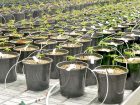
Features
Re-growing Ontario
Cannabis producers rebuilding economies across the province
August 19, 2019 By Andrew Snook
 The emergence of the cannabis industry in Canada has sparked new hopes for economic prosperity in towns where some of the biggest cannabis producers in the country are setting up shop. Photo: Nicole Breanne/48North
The emergence of the cannabis industry in Canada has sparked new hopes for economic prosperity in towns where some of the biggest cannabis producers in the country are setting up shop. Photo: Nicole Breanne/48North In 2010 and 2011, the town of Smiths Falls, Ont., was a tough place to earn a living. Between 2007 and 2009, the small town of less than 9,000 residents had its economy devastated through the closures of the Hershey’s chocolate plant, Stanley Tools plant, and the Rideau Regional Centre; which combined, employed a total of nearly 1,500 people in the area. The closures of Hershey’s and Rideau Regional Centre were particularly harmful, and not just because they were the town’s two largest employers. Hershey’s was a major draw for tourism to the town, which meant further job losses and reduced town revenues followed; and the closure of the Rideau Regional Centre left many of its inhabitants calling Smiths Falls their new home, creating a greater strain on the town’s already stretched resources.
Closures of additional businesses followed, bringing the total job losses up to about 1,800 – taking what little air of optimism was left out of many of the town’s residents. I can say this great certainty, because I was there, working as a reporter for one of the local newspapers during that time. While covering stories for the newspaper and chatting with local residents, the atmosphere was often one of great negativity and hopelessness in regards to the town’s economic situation. When I left the newspaper and moved to Toronto at the end of 2011, I had hoped the town would find a way to rebuild, but I couldn’t fathom how it would overcome such losses.
Then in 2013, I read about a company setting up a small cannabis operation in the old Hershey’s plant. When I asked old friends and acquaintances about the existence of this new entity, I was met with my first taste of optimism surfacing in the town. No one I spoke with back then knew that Tweed would one day transform into Canada’s largest Cannabis producer, Canopy Growth Corporation; but residents were excited that a company was willing to take over part of the old chocolate plant that had sat dormant for five years.
This spring I had the opportunity to travel back to Smiths Falls for the first time since the passing of the Cannabis Act, and what a difference it has made.
Canopy Growth currently employs approximately 1,300 people in Smiths Falls, and the company is not done yet.
“They’re looking at hiring possibly another 500 to 550 people locally by the end of their fiscal year,” says Mayor of Smiths Falls Shawn Pankow during a meeting at the town’s Department of Economic Development.
Pankow estimates that the company will be close to 2,000 employees a year from now and will boast over one million square feet of production space. Canopy Growth’s expansion has not only resulted in additional new jobs, but also an increase in demand for residential and commercial construction, higher property values, new restaurants and services popping up in town, and is expected to bring back tourism dollars with its new welcome centre and retail cannabis shop set to open in the near future.
“This year we’ll probably eclipse all the job losses, and overall, have a bigger economic impact,” Pankow says. “Certainly our sense of optimism has never been higher.”
Unemployment stands at about half what it was before Canopy Growth came to Smiths Falls, and the potential for the company’s employees to share in the riches is impressive.
“Every employee has stock options. Everyone from the guys trimming the plants to the executives,” Pankow says, adding that he recently chatted with a woman in her forties who turned her luck around when she and her husband both decided to move to Smiths Falls to work at Canopy Growth. “She said, ‘A few years ago we had $2,400 in savings. Now, we have over $200,000.’ Multiply that by hundreds of people.”
Smiths Falls’ recent good fortune shouldn’t be entirely contributed to Canopy Growth, the town itself helped chart the path it is now on.
“In 2013, the town themselves was willing to allow a cannabis facility into their community,” says Canopy Growth’s vice-president of communications Jordan Sinclair, who adds that back then cannabis still battled a significant stigma.
Sinclair says his company’s team was very good about being transparent with the town and made modest promises in terms of employment and its use of the Hershey’s facility when they initially addressed the town.
“Bruce Linton (the company’s founder) had a good track record – no connection to organized crime. Just a high-tech professional that saw a changing landscape,” Pankow says.
And it’s not just a boost in employment that Canopy Growth wants to bring to Smiths Falls’ current residents. Sinclair says the company is interested in investing in building a place that attracts more people from outside of town to come and live there. The company invests in the town’s local theatre and has announced plans to help with the re-development of Smiths Falls’ old water treatment plant.
“I can’t imagine any other industry that could have come into town and changed our futures like this,” Pankow says.
Not just wine country
Smiths Falls isn’t the only town in Ontario to benefit from a booming cannabis industry.
The Niagara Region, due to its prime agricultural lands, is now home to several cannabis production operations that have set up shop in towns throughout the region. One of those companies is CannTrust, which employs more than 400 people at its facility in Welland; and approximately 700 in total across Ontario when you include the company’s facilities in Vaughan.
CannTrust is heavily invested in the communities it operates within and believes in building positive relationships with the residents of those towns and cities.
The company recently launched its We Care national social responsibility platform, which focuses on four key areas: lifting people out of poverty; health and wellness; safe consumption; and sustainability.
Morgan Cates, director of communications for CannTrust, says the We Care platform showcases her company’s special culture.
“We want to showcase how caring and giving the people in our company actually are,” she says, adding that the We Care platform originated from the company’s philosophy within its customer care team.
The first We Care partnerships announced were a $50,000 donation to the Canadian Alliance to End Homelessness (CAEH) for the non-profit’s Built for Zero campaign; a donation of $25,000 to Project SHARE; and a three-year commitment of $25,000 in annual donations to Hospice Niagara for its music therapy program.
For Project SHARE’s executive director Diane Corkum, who has worked with the organization off and on for the past 30 years, the donation from CannTrust was “a wonderful bolt of lightning from the sky.”
Project SHARE provides emergency foods to 126 families living below the poverty line every day in the Niagara Falls area. The organization runs three community and allotment gardens that grow 4,000 pounds of organic produce for local food banks. In addition to the $25,000 donation for the Project SHARE 2019 community garden season, CannTrust is donating volunteer hours and its knowledge as experts in cultivation.
Over the past three years, Project SHARE had been receiving its funding through the Ontario Trillium Foundation, but those funds had run out this past February; leaving the organization scrambling for new funding. CannTrust reached out to the organization to offer donations to cover the funding for materials and other needed funding for the 2019 growing season.
“It was a really nice surprise. They’ve been wonderful to deal with,” Corkum says.
Director of Hospice Niagara Carol Nagy attended the local launch of the We Care platform and thanked CannTrust for its support of the hospice’s music therapy program, designed to help people through one of the most difficult times in their lives.
“One of our dreams was to start a music therapy program because we know how music can touch our lives,” she says, adding that her organization spent years trying to search out corporate funding for the program without success.
Michael Caplin, general manager for CannTrust’s Niagara operations, said that the giving and caring philosophies of his organization are something shared by all its employees.
“It has become our mantra that every CannTrust employee lives and breathes,” he says.
Northern exposure
Although Southern Ontario has benefited greatly from the cannabis boom, at least one town in Northern Ontario is starting to reap the rewards of marijuana legalization.
Approximately 600 kilometres north of 48North’s headquarters on Queen Street in Toronto is the cannabis producer’s 40,000-sq.-ft. DelShen facility in Kirkland Lake, Ont., which was constructed in late 2015 and 2016. 48North received its cultivation license for the property in February 2017 and its sales license in June 2018.
This location has a maximum annual production capacity of 2,500 kilograms of cannabis. The only post-processing currently performed at the facility is for dry flower sales, and for pre-rolls for the Ontario and Alberta markets, says Jeanine Lassaline Berglund, vice-president of operations for 48North.
The DelShen facility currently employs close to 40 full-time staff, a few students in the summertime, and expects to hire additional staff in the future. The company partners with First Nations communities in the area to utilize their local agricultural knowledge, and for access to local talent.
“In some cases it comes at a subsidized rate, which is building skills for those groups who don’t necessarily have access to skill building, while simultaneously meeting our needs,” Berglund says.
When the company set up shop in the small town of less than 8,000 residents, the operation initially went fairly unnoticed.
“At the dawn of this industry when everything was indoors it went relatively unnoticed for a long time… but as soon as you put a farm in next door, all of a sudden everybody is on board or against you. Those are the risks,” Berglund says, adding that residents mostly welcomed the facility as a new option for employment. “Particularly in that area, gold mining is a significant employer. If you want to find other kinds of work you might be forced to leave the community. But for the people who are looking to do something a little bit different, or are not pre-disposed to be in that industry, the cannabis industry offers a good living, a nice place to work.”
In addition to the 40 people employed at Kirkland Lake, the company employs another 25 people in Toronto and 15 people in Brantford; which is in the midst of an expansion with the company’s recent approval for outdoor cultivation at its 100-acre Good Farm in Brant County. The Good Farm outdoor cultivation facility is expected to produce approximately 40,000 kilograms of cannabis. Berglund says this location has the potential to employ 50 full-time staff and upwards of 200 seasonal employees in peak season.
School is in
The legalization of the cannabis industry has led to new courses and education programs being offered by post-secondary institutions. In Niagara-On-The-Lake, Niagara College now offers a post-secondary education in commercial cannabis production.
The University of Guelph is obtaining more than $20 million in funding for the construction of the Guelph Centre for Cannabis Research, designed for the cultivation of marijuana for scientific study.
In Kirkland Lake, 48North works with local vegetation institutions to offer post-graduate cannabis educations to residents.
The future is green
Just between the Canopy Growth Corporation, CannTrust and 48North, several towns across Ontario are benefitting from thousands of new jobs with lots of potential for future growth. And these are only a few of the current and future producers setting up and expanding across Canada’s new cannabis landscape.
People are pulling up stakes across a variety of sectors and relocating across the province to be part of a growing new movement that requires a wide variety of skill sets and professionals.
“Certainly this has given the agriculture sector a much-needed boost – not only in employment but in popularity,” Berglund says, adding that it’s not just agricultural skills cannabis producers are looking for to keep their futures bright moving forward. “People are coming with transferrable skills who might not be able to grow anything, but if you know finance, or if you’ve done some work in HR, or you’re in I.T., or you’re in manufacturing engineering, all of those things will play a role. Running a business is running a business.”
Andrew Snook is a freelance writer based in Toronto.
Print this page





